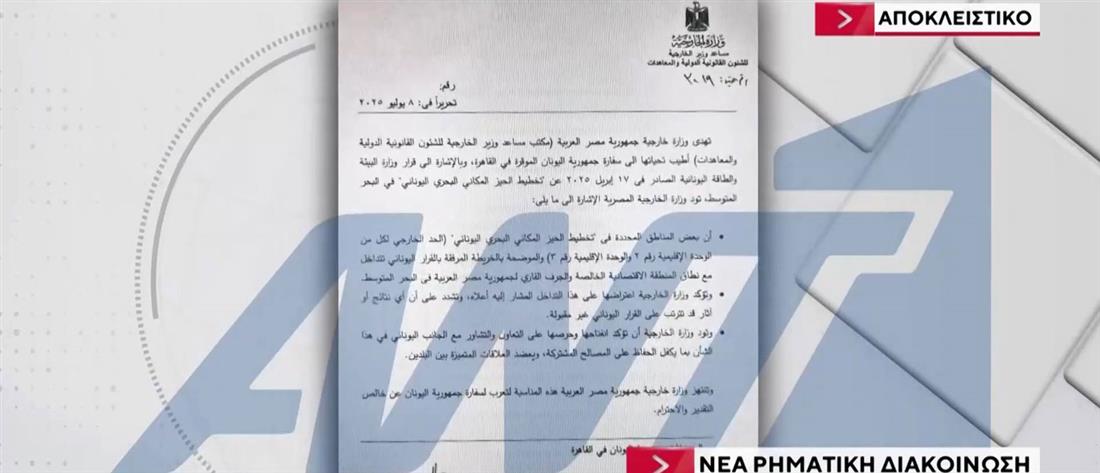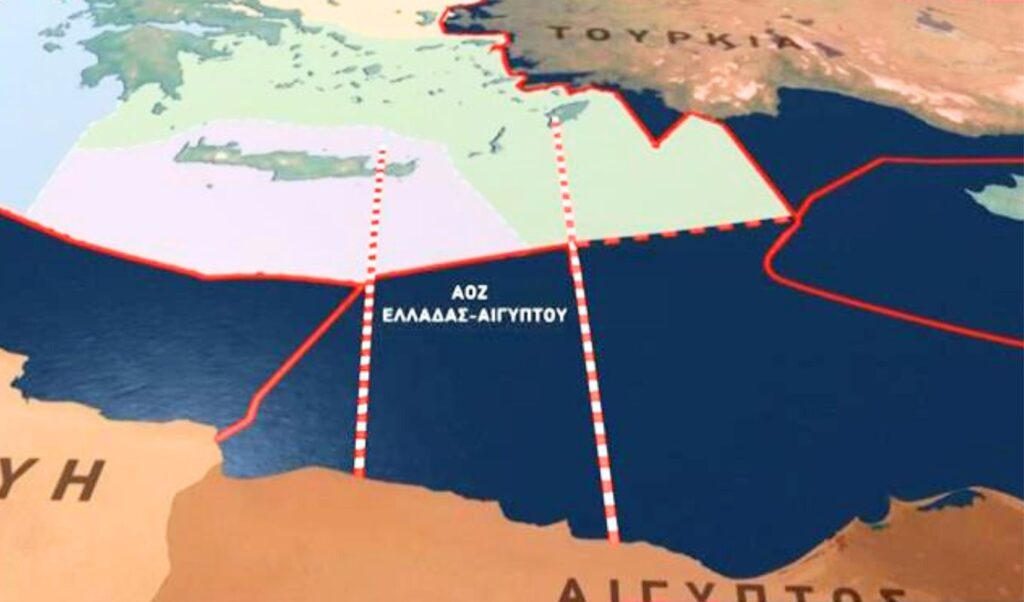Egypt sent a verbal diplomatic note to the Greek embassy in Cairo on July 8, challenging the boundaries of the Greek Exclusive Economic Zone (EEZ) and continental shelf in the Mediterranean, following the publication of the map with the Greek Maritime Spatial Planning.
According to ANT1, the document states that certain areas of the Greek planning overlap with the Egyptian EEZ and continental shelf, while the Egyptian Ministry of Foreign Affairs expresses its strong objection and considers unacceptable the consequences that may arise from the Greek decision.

How the EEZ and Greek-Egyptian relations are affected
Naturally, the questions that arise concern how all this affects the EEZ and relations between Greece and Egypt, given that the two countries have proceeded with partial EEZ delimitation.
Initially, with the “Greek Maritime Spatial Planning,” Greece attributed the maximum EEZ based on the median line principle, according to international law and the law of the sea. Most importantly, there was a point of its own EEZ that intersected with the EEZ of the Republic of Cyprus.
To the west, the Greece-Egypt-Libya tripoint shrinks considerably. If implemented, it means that Libya will be able to claim a larger EEZ than it is entitled to, which is the median line based on international law and the Law of the Sea.
To the east, however, there is an even bigger problem, as Egypt’s claims eliminate the Greece-Cyprus-Egypt tripoint and it becomes Greece-Turkey-Egypt. Essentially, Greece loses EEZ and the intersection point with Cyprus.
According to an experienced diplomat, with the verbal note Egypt repeats its established positions. It accepts in principle the median line principle – and naturally that islands have EEZ and continental shelf – but the median line undergoes adjustments based on any special circumstances.
This was also their position during negotiations for the 2020 partial delimitation, hence the reduced influence (for demographic/geographical/economic reasons) of Rhodes, Karpathos, Kasos, and the eastern tip of Crete.
However, the timing of sending the verbal note raises legitimate questions.
Egypt’s verbal diplomatic note
In detail, the complete verbal diplomatic note from Egypt:
The Ministry of Foreign Affairs of the Arab Republic of Egypt (Office of the Assistant Minister of Foreign Affairs for International Legal Affairs and Treaties) presents its compliments to the Embassy of the Hellenic Republic in Cairo and, referring to the decision of the Ministry of Environment and Energy of Greece issued on April 17, 2025, regarding the ‘Greek Maritime Spatial Planning’ in the Mediterranean, the Ministry of Foreign Affairs of Egypt would like to point out the following:
Certain areas defined in the ‘Greek Maritime Spatial Planning’ (the external boundaries of spatial unit NO. 2 and spatial unit NO. 3) and shown on the map attached to the Greek Decision, overlap with the scope of application of the EEZ and continental shelf of the Arab Republic of Egypt in the Mediterranean Sea.
The Ministry of Foreign Affairs (of Egypt) confirms its objection to the aforementioned intervention and emphasizes that any consequences or impacts that may arise from the Greek decision are unacceptable.
The Ministry of Foreign Affairs wishes to confirm its openness and commitment to cooperation and consultation with the Greek side on this matter, in order to maintain common interests and strengthen the distinguished relations between the two countries.
The Ministry of Foreign Affairs of the Arab Republic of Egypt takes this opportunity to express to the Embassy of the Hellenic Republic its appreciation and respect.
TO THE EMBASSY OF THE HELLENIC REPUBLIC IN CAIRO




